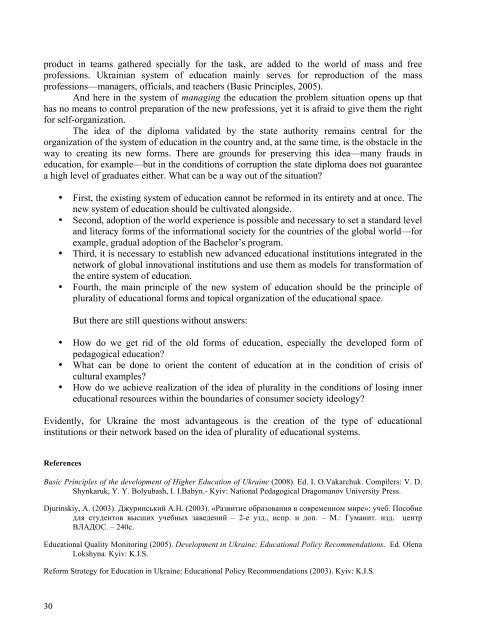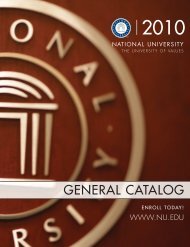Journal of Research in Innovative Teaching - National University
Journal of Research in Innovative Teaching - National University
Journal of Research in Innovative Teaching - National University
You also want an ePaper? Increase the reach of your titles
YUMPU automatically turns print PDFs into web optimized ePapers that Google loves.
product <strong>in</strong> teams gathered specially for the task, are added to the world <strong>of</strong> mass and free<br />
pr<strong>of</strong>essions. Ukra<strong>in</strong>ian system <strong>of</strong> education ma<strong>in</strong>ly serves for reproduction <strong>of</strong> the mass<br />
pr<strong>of</strong>essions—managers, <strong>of</strong>ficials, and teachers (Basic Pr<strong>in</strong>ciples, 2005).<br />
And here <strong>in</strong> the system <strong>of</strong> manag<strong>in</strong>g the education the problem situation opens up that<br />
has no means to control preparation <strong>of</strong> the new pr<strong>of</strong>essions, yet it is afraid to give them the right<br />
for self-organization.<br />
The idea <strong>of</strong> the diploma validated by the state authority rema<strong>in</strong>s central for the<br />
organization <strong>of</strong> the system <strong>of</strong> education <strong>in</strong> the country and, at the same time, is the obstacle <strong>in</strong> the<br />
way to creat<strong>in</strong>g its new forms. There are grounds for preserv<strong>in</strong>g this idea—many frauds <strong>in</strong><br />
education, for example—but <strong>in</strong> the conditions <strong>of</strong> corruption the state diploma does not guarantee<br />
a high level <strong>of</strong> graduates either. What can be a way out <strong>of</strong> the situation?<br />
• First, the exist<strong>in</strong>g system <strong>of</strong> education cannot be reformed <strong>in</strong> its entirety and at once. The<br />
new system <strong>of</strong> education should be cultivated alongside.<br />
• Second, adoption <strong>of</strong> the world experience is possible and necessary to set a standard level<br />
and literacy forms <strong>of</strong> the <strong>in</strong>formational society for the countries <strong>of</strong> the global world—for<br />
example, gradual adoption <strong>of</strong> the Bachelor’s program.<br />
• Third, it is necessary to establish new advanced educational <strong>in</strong>stitutions <strong>in</strong>tegrated <strong>in</strong> the<br />
network <strong>of</strong> global <strong>in</strong>novational <strong>in</strong>stitutions and use them as models for transformation <strong>of</strong><br />
the entire system <strong>of</strong> education.<br />
• Fourth, the ma<strong>in</strong> pr<strong>in</strong>ciple <strong>of</strong> the new system <strong>of</strong> education should be the pr<strong>in</strong>ciple <strong>of</strong><br />
plurality <strong>of</strong> educational forms and topical organization <strong>of</strong> the educational space.<br />
But there are still questions without answers:<br />
• How do we get rid <strong>of</strong> the old forms <strong>of</strong> education, especially the developed form <strong>of</strong><br />
pedagogical education?<br />
• What can be done to orient the content <strong>of</strong> education at <strong>in</strong> the condition <strong>of</strong> crisis <strong>of</strong><br />
cultural examples?<br />
• How do we achieve realization <strong>of</strong> the idea <strong>of</strong> plurality <strong>in</strong> the conditions <strong>of</strong> los<strong>in</strong>g <strong>in</strong>ner<br />
educational resources with<strong>in</strong> the boundaries <strong>of</strong> consumer society ideology?<br />
Evidently, for Ukra<strong>in</strong>e the most advantageous is the creation <strong>of</strong> the type <strong>of</strong> educational<br />
<strong>in</strong>stitutions or their network based on the idea <strong>of</strong> plurality <strong>of</strong> educational systems.<br />
References<br />
Basic Pr<strong>in</strong>ciples <strong>of</strong> the development <strong>of</strong> Higher Education <strong>of</strong> Ukra<strong>in</strong>e (2008). Ed. I. O.Vakarchuk. Compilers: V. D.<br />
Shynkaruk, Y. Y. Bolyubash, I. I.Babyn.- Kyiv: <strong>National</strong> Pedagogical Dragomanov <strong>University</strong> Press.<br />
Djur<strong>in</strong>skiy, A. (2003). Джуринський А.Н. (2003). «Развитие образования в современном мире»: учеб. Пособие<br />
для студентов высших учебных заведений – 2-е узд., испр. и доп. – М.: Гуманит. изд. центр<br />
ВЛАДОС. – 240с.<br />
Educational Quality Monitor<strong>in</strong>g (2005). Development <strong>in</strong> Ukra<strong>in</strong>e: Educational Policy Recommendations. Ed. Olena<br />
Lokshyna. Kyiv: K.I.S.<br />
Reform Strategy for Education <strong>in</strong> Ukra<strong>in</strong>e: Educational Policy Recommendations (2003). Kyiv: K.I.S.<br />
30

















